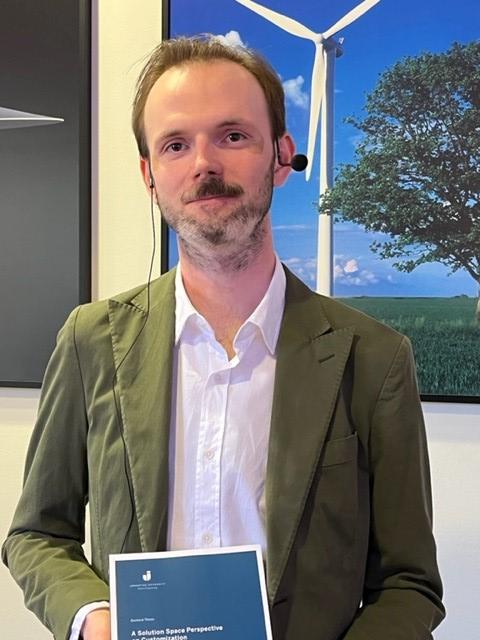New thesis explores challenge of increased demands for customization
Nikolas Käkelä, new PhD at the School of Engineering, Jönköping University, defended his thesis “A Solution Space Perspective on Customization” on 6 May. In it he argues that when it comes to customization, industries should manage complexity rather than try to eliminate it.

Nikolas Käkelä’s thesis is based on the manufacturing industry, which has historically been characterized by standardization and mass production, but where more and more companies are experiencing increased demands for customization and associated services.
“My focus has been to describe how companies can approach customization in different ways, and explain what implications this has for, for example, organization and knowledge development,” says Nikolas Käkelä.
Previous experience from both sales and purchasing of complex customization solutions, such as deliveries of power links to offshore wind farms at ABB, as well as procurement of production equipment at Volvo Trucks, drew Nikolas Käkelä's attention to the importance of customization in industrial contexts.
“The research highlights important factors that should be taken into account when companies define their offer, which can be of great benefit to people in management positions who work with issues related to the company's product, service or solution offering,” says Nikolas Käkelä.
The overall argument of the thesis is that the approach to customization, for example if the company is based on a module-based product range or if they rather tailor customer-unique solutions from scratch, is of great importance in terms of what challenges they will face and how they should tackle them. For companies that provide several offers in parallel with different degrees of customization, it is important to review how different types of deliveries can serve each other.
“It is not uncommon to hear calls for standardization and simplification from within the organization, as customization often causes problems and disruptions in internal flows. However, it is important to remember that the competitiveness of certain offers is based on managing complexity rather than eliminating complexity,” says Nikolas Käkelä.
Nikolas Käkelä will continue his work at the School of Engineering with both research and teaching.
“I see the thesis as a first step in my research on the subject and would like practitioners or researchers who find the subject interesting to contact me if they want to explore possible collaboration opportunities,” says Nikolas Käkelä.
The main supervisor for the dissertation was Professor Joakim Wikner, School of Engineering, Jönköping University. The opponent of the dissertation was Professor Mohammed Naim, professor at Cardiff Business School, UK.
Read the dissertation
